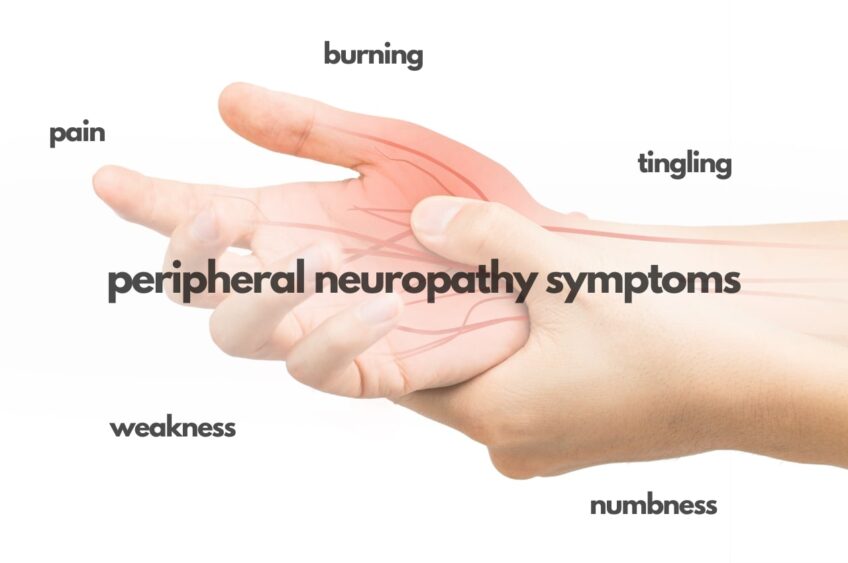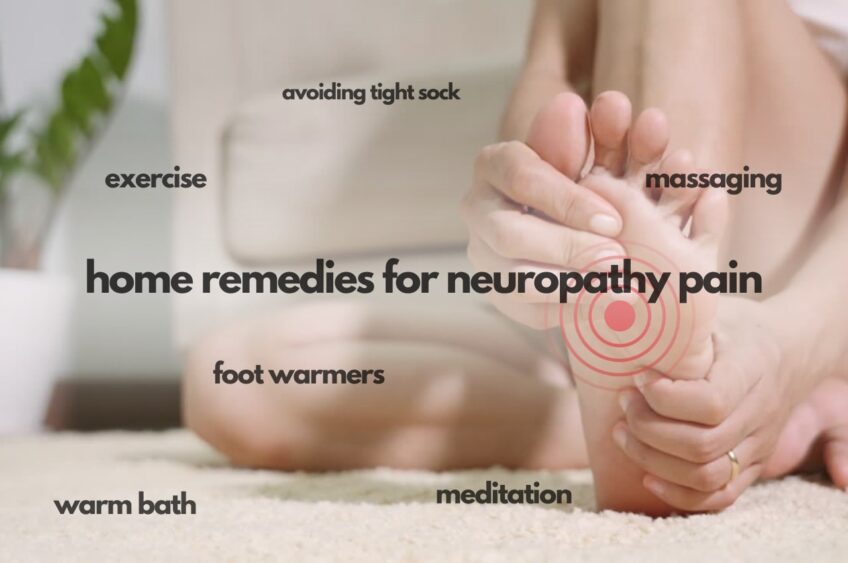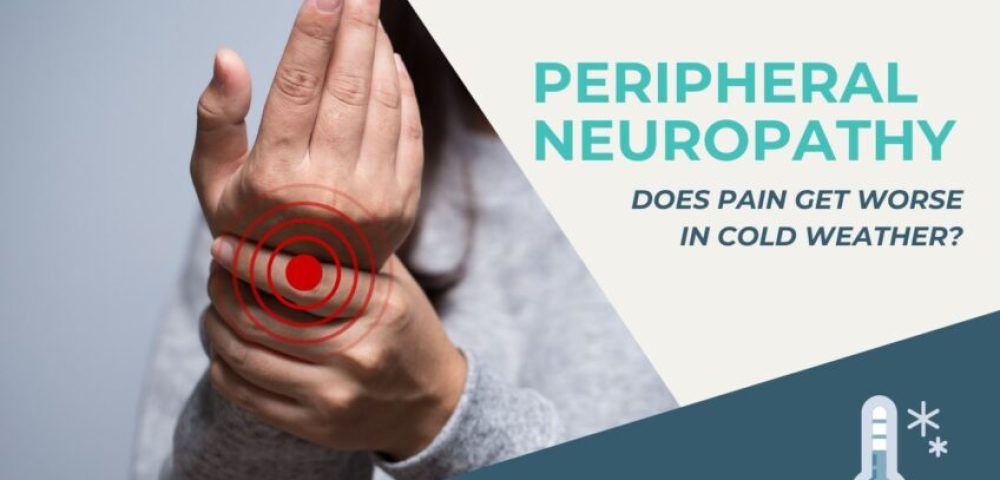It’s time for chilly days, frosty nights, and a steaming cup of coffee. While the cold weather often feels cozy, it can also bring along some not-so-cozy effects–like an increase in peripheral neuropathy pain.
In this blog, we’ll look at what causes this physical discomfort and how to deal with it so that you can still enjoy the winter season:
Peripheral neuropathy occurs when nerves that are located outside of your brain and spinal cord become damaged and can no longer send messages correctly throughout the body.
This can cause uncontrollable pain, numbness and tingling sensations in the legs, hands, feet and other areas of the body. It can also cause a sensation of burning or cold weather which often becomes worse in cold temperatures.
While many people suffer from this condition year-round, it is important to take steps to help ease symptoms during colder months. In this article, we will discuss what peripheral neuropathy is and how it can be managed in order to reduce cold weather pain. We will also provide tips on how to protect yourself from developing further nerve damage.
Page Contents
What is Peripheral Neuropathy?

Peripheral neuropathy is a condition in which the nerves become damaged, leading to a wide range of symptoms such as pain, burning, tingling, numbness and weakness. Neuropathy can be caused by an underlying medical condition or be acquired through a traumatic injury. It is more common in the feet and hands due to the small nerve fibers located there that are most vulnerable. It can cause nerve damage throughout the body and lead to serious complications if left untreated.
The cause of neuropathy can vary greatly depending on factors like exposure to toxins or radiation, trauma, genetic predisposition or autoimmune conditions like diabetes. In some cases, it’s not clear what specifically triggers neuropathy to form but certain illnesses and injuries may play a role. Treatment typically focuses on symptom relief and managing any underlying causes. This may include:
- Medications
- Physical therapy
- Lifestyle changes such as quitting smoking or starting an exercise program depend on what is causing the neuropathy.
How Does Cold Weather Affect Neuropathy Pain?
One of the more common complaints amongst those suffering from this condition is that the pain in their feet and hands—which is often described as burning, tingling, or stabbing—seems to suddenly worsen when exposed to cold temperatures.
The exact reason why cold weather makes neuropathy pain worse is still unclear. However, scientists believe that it has something to do with the way in which our body’s temperature regulation works in cold temperatures.
When exposed to low temperatures our body restricts blood flow to our extremities in order to preserve heat and energy. This restricted blood flow then causes an interruption of nerve signals which can lead to an increase in neuropathic pain symptoms such as burning and tingling sensations.
In addition, research has also suggested that individuals with diabetes are more likely to experience increased neuropathic symptoms when exposed to cold temperatures due to diabetes-induced nerve damage being exacerbated by lower temps. As such, those suffering from diabetes-related peripheral neuropathy should take extra precautions when spending prolonged periods outdoors during winter months.
It is also important for those suffering from Peripheral Neuropathy caused by any other factors—such as chemotherapy treatments—to take extra caution when venturing outdoors on especially chilly days as well. Wearing multiple layers of clothing including socks and gloves at such times can help keep sensitive skin warm and provide some much-needed relief against uncomfortable increases in nerve pain brought on by fall and winter weather changes.
Risk Factors

- Age: The older you are, the more likely you are to develop this condition. People over age 65 have an increased chance of developing peripheral neuropathy, especially from diabetes or chemotherapy.
- Diabetes: High blood sugar levels damage nerves over time, leading to an increased risk for developing peripheral neuropathy.
- Injury: Trauma to an area of your body puts the nerves at risk for damage – especially if you do not receive timely medical attention and treatment.
- Vitamin Deficiencies: Low levels of B vitamins can increase your risk for developing this condition. Vitamin deficiency may also lead to nerve damage caused by poor nutrition or other underlying factors like alcoholism.
- Hereditary Disorders: Certain genetic disorders cause peripheral neuropathy because they interfere with how your body processes certain proteins or neurotransmitters used in nerve signaling or transmission.
- Disease or infections: For example, Lyme disease can also cause nerve damage although rarer than other causative factors listed above.
Treatment Options
As peripheral neuropathy pain can be debilitating, there are various treatment strategies available for those who suffer from this condition. These therapies often focus on relieving the symptoms of neuropathy pain, such as numbness, tingling, and burning sensations.
Medication is typically the first line of defense. Over-the-counter medications such as ibuprofen and acetaminophen can help relieve milder forms of pain; however, they may not be effective in managing more severe cases. Prescription medications have been developed to specifically target neuropathic pain. Antidepressants, anti-seizure drugs, and some opioids have been used with some success in treating neuropathic pain.
Non-medicinal treatments are also useful in managing neuropathy symptoms. Physical and occupational therapy can strengthen the muscles affected by neuropathy, enabling them to better support joints and aid in alleviating pain.
Specialized techniques such as massage therapy or acupuncture can also help reduce inflammation associated with peripheral nerve damage that leads to chronic discomfort and pain levels. Additionally, lifestyle modifications such as smoking cessation and maintaining a healthy weight are important steps towards reducing neuropathy symptoms caused by diabetes or other underlying conditions.
Home Remedies for Neuropathy Pain

Home remedies for neuropathy pain can help relieve discomfort, keep symptoms under control, and reduce the risk of damage to nerves for those with peripheral neuropathy. It is important to talk with your doctor about any home remedies you are considering or using so that they can provide guidance on what may work best for your individual needs.
For many people with neuropathy, there are a variety of lifestyle changes that may help alleviate symptoms. These can range from making dietary changes to reducing stress levels. Additionally, gentle exercises several times a week may help improve balance and reduce the risk of falls which can be especially concerning in cold weather.
Other lifestyle tips include:
- Timely rest periods during the day
- Soaking hands and feet in warm water for 10 minutes several times a day to encourage circulation
- Massaging affected areas with lotions or balms that contain menthol or capsaicin
- Avoiding tight socks and shoes or clothes that restrict movement
- Keeping house cold at 60-65°F (countered by wearing multiple layers)
- Using foot warmers if needed while in bed at night and keeping feet uncovered under blankets as much as possible
- Avoiding bedroom temperatures over 68°F (20°C)
If these home remedies do not seem to be helping manage your symptoms of peripheral neuropathy pain then consult your doctor about more targeted treatments such as physical therapy or medications specifically designed to treat nerve pain.
Managing Neuropathy Pain in Cold Weather

Persons suffering from peripheral neuropathy pain may experience an increase in discomfort during colder weather. Since neuropathy pain is caused by a variety of underlying conditions such as diabetes, cancer, and autoimmune disorders, the causes of neural pain during cooler temperatures can be varied.
While some individuals might feel more severe symptoms due to temperature-sensitive nerve damage or increased inflammation caused by cold weather exposure, others might be affected by changes in barometric pressure.
In any case, there are some measures that individuals living with neuropathy pain can take to better manage their condition in cold weather. These include:
- Dressing for cold temperatures with several layers of clothing rather than opting for clothes made of natural fibers like cashmere and wool that provide added warmth without suffocating the skin;
- Using heat pads on painful areas to reduce inflammation;
- Avoiding extremely cold environments such as walking outside during snowstorms and taking warm showers or baths to lower body temperature levels; and
- Keeping affected hands and feet bundled when exposed to cooler temperatures.
Additionally, staying physically active throughout the year can help improve circulation which supports healthy nerves and allows individuals to cope better with existing nerve damage in colder months.
Conclusion
To conclude, peripheral neuropathy pain can be especially bad in cold weather, but it’s not definite. While some people can feel the intense discomfort brought on by cold temperatures or cold objects touching their skin, others may not experience this at all. It is recommended to stay as warm as possible during cold days to help minimize discomfort from chronic peripheral neuropathy pain.
Furthermore, work with your doctor or specialist to develop an effective plan for managing peripheral neuropathy that can help relieve your symptoms regardless of whether its hot or cold outside.
Astrona Knight is the Editor-in-Chief at Fischer Institute, where she shares her extensive knowledge on health and wellness topics. Her insightful articles cover everything from diet and nutrition to mental health, providing readers with practical tips and the latest research findings.
Also Read:
- Does Cold Showers Increase Testosterone? - Yes, But…
- Dry Needling Piriformis: Find Relief for Sciatic Nerve Pain
- Can Hemorrhoids Cause Vulvar Pain? - Understanding…
- 8 Best Supplement For Arthritis In Hands - Relieving…
- Can You Get a Pedicure if You Have Toenail Fungus?…
- Get Rid Of Armpit Fat In A Jiffy With These 7…















